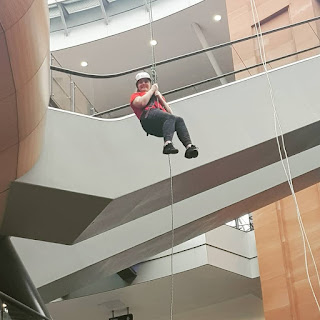I've got this disease that I can't shake, and I'm just rattling through life. #mentalhealthawarenessweek #mentalhealthawarenessmonth
“Mental health” is a modern buzz-word. A sure hit as a hashtag and when it’s said
everybody in the room nods knowingly. We
know it’s important, and most of us have felt the very real impact of having
bad mental health. However, what can we actually DO?! For ourselves and for
others in a crisis.
For other awareness months for let’s say *breast cancer* we
get a list of symptoms. We get information
on screening services, self-checking, hereditary genes on how you can get
diagnosed. How you can get treated, rid
yourself of the cancer and on the road to be completely cancer-free.
Sadly mental health isn’t as ultimately fixable in my
opinion. Although the campaigns for
mental health awareness are valuable I believe it’s time to look past awareness
and get to some actual support. Me being
aware of breast cancer doesn’t help anyone if I can’t help them get treatment
or support. What’s the difference
between awareness and support?
Firstly, not all mental health issues can be solved by a
chat with a friend over coffee. I’m
sorry but that’s not enough. We need
real and definite support. We need free therapy
for those who need it. At the minute if
you ask your GP for a referral to counselling (and you’re not suicidal) you’ll
be waiting 8 months on average. Local
charities have the same waiting times.
Most of these counselling sessions will be capped at 6 sessions. If you need more you’ll be charged £40 a
session. If you can’t afford it you’ll
not be helped until you’re at crisis point again. Is there anybody who thinks this is
enough?
We need appropriate medication (if needed) with routine
reviews with a psychiatric professional to make
sure the medication is still needed and having the desired affects. In most cases with those who have mental
illnesses we are sent home with a tablet on repeat prescription unless we
decide to stop taking it or take a new or different dosage. There is no guidance and no reviews with the
patient. I think this is for a number of
reasons, and the one that comes to mind for me is that our GPs are not
specially trained in diagnosing and reviewing mental health patients. Why are all people who suspect they have a
mental illness being diagnosed and medication by a professional not specially
trained in mental illness?
In order for there to be any sort of real awareness I would
propose for new legislation amongst schools, workplaces and community groups to
incorporate mental health workshops. Like
health and safety is prioritised currently.
These could give people a chance to explore general mental health and
every day ways to help. This has been
most recently broadcast as take 5 (https://www.publichealth.hscni.net/publications/take-5-steps-wellbeing-english-and-11-translations)
which (as a general information for all) I think is great. These workshops could explore those 5 steps
on a personal level as an effort to maintain personal mental health. Much in the same wavelength as physical
wellbeing is being taught as eat well, exercise, stay safe in the sun, don’t
smoke and don’t drink.
These mental health workshops could additionally serve as
information points for everybody, and to gain essential knowledge how to cope
with bad mental health in themselves and those around them. However if order for these to be successful
we need the two main sources of support explored above for more complex mental
issues/illnesses.
I’d love to know more ‘hands-on’ ideas on how we could look
after ourselves and each other’s mental health.
All my feelings,
J9
J9

Comments
Post a Comment